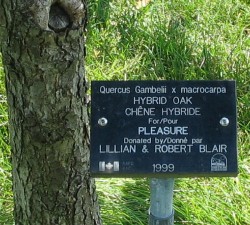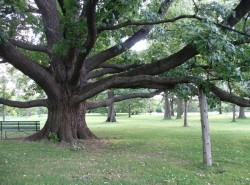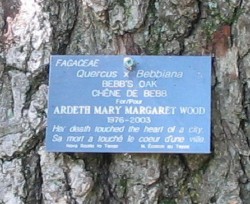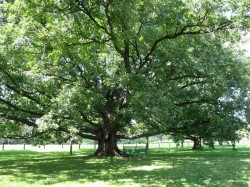The Labour Day weekend this year was a gift of ideal weather to us in Ottawa. If I were to custom-order some weather, that’s exactly what I would order.
I wandered down to Fletcher’s Wildlife Garden and the Arboretum at the Experimental Farm twice on the long weekend: once on Sunday evening, again on Monday afternoon.
 The Arboretum, if you’re not familiar with it, is like an outdoor tree museum. Thousands of trees, all labelled, all well cared for. Many of them were purchased as gifts in memory of loved ones who died.
The Arboretum, if you’re not familiar with it, is like an outdoor tree museum. Thousands of trees, all labelled, all well cared for. Many of them were purchased as gifts in memory of loved ones who died.
Anyway, I was wandering from tree to tree, reading their memorial plaques, and wondering about all these strangers who had died and all these other strangers who had chosen to immortalize their memories with trees. Mostly I was just wondering what their stories were, because the plaques are merely suggestive. They just give a hint of a much deeper and unknowable story.
 Take this one for example: Is Pleasure a person? A dog? A feeling?
Take this one for example: Is Pleasure a person? A dog? A feeling?
Some of the trees were bigger and more established, while others were delicate little newcomers. Off in the distance, I saw a mighty oak, and headed for it.
It was astonishing. This photo does not do it justice, because there’s no sense of scale here. Each of those horizontal branches is about as big around as a regular tree’s trunk. One of the lower branches is supported by a beam. This is a crazy big tree.
 It reminded me of my favourite book when I was growing up: The Magic Faraway Tree, by Enid Blyton. There were all kinds of creatures living in the Magic Faraway Tree, in apartments in the trunk – the Saucepan Man, Moonface, Dame Washalot, Mr. Whatsisname. And at the top of the tree, there was a passageway to other worlds, which rotated in and out. One day it might be the Treacle Toffee World, and the next day it might be Upside-Down World. Some of the worlds were spectacularly good, others were menacing.
It reminded me of my favourite book when I was growing up: The Magic Faraway Tree, by Enid Blyton. There were all kinds of creatures living in the Magic Faraway Tree, in apartments in the trunk – the Saucepan Man, Moonface, Dame Washalot, Mr. Whatsisname. And at the top of the tree, there was a passageway to other worlds, which rotated in and out. One day it might be the Treacle Toffee World, and the next day it might be Upside-Down World. Some of the worlds were spectacularly good, others were menacing.
This is what the mighty oak tree at the Arboretum reminded me of. I sat on the bench to think for a bit, and that’s when I saw the plaque.
 The mighty oak is Ardeth Wood’s tree. Ardeth, “whose death touched the heart of a city.” I never knew Ardeth, but I felt that shock of recognition, like when you unexpectedly come across the obituary of someone you know in the paper.
The mighty oak is Ardeth Wood’s tree. Ardeth, “whose death touched the heart of a city.” I never knew Ardeth, but I felt that shock of recognition, like when you unexpectedly come across the obituary of someone you know in the paper.
What could I remember of her? That she was 27 years old, that she was a PhD student at Waterloo, that she disappeared in the middle of the day while cycling along a bike path in Ottawa, that her body was found days later, that she had been raped, that years later a man was charged with her murder. Those are the facts.
I remember the feelings much more acutely than the facts. They all came rushing back at me as I sat under Ardeth’s tree while two little chipmunks chased each other around its mighty trunk.
I also thought about several other young women who were raped and murdered in Ottawa, but promptly forgotten because they were prostitutes rather than PhD students. Melinda Sheppit, Kelly Morrisseau, the woman whose body was found behind Puzzles on Richmond Road, others whose names I’ve forgotten. The ones whose deaths didn’t touch the heart of a city.
I’m glad Ardeth has a tree though.

















While the rape and murder of any person is of course very upsetting, I have to admit that I found the public hue and cry surrounding the end of Ms. Wood’s life odd, disproportionate, and frankly, in poor taste.
The violent end of a woman’s life in one’s city will necessarily become, to some degree, a public event and news. And if the perpetrator of the crime goes uncaught for some time, as he did in this case, the degree will be greater. However, the public dolor over this went on and on, and its pitch bordered on a cult of Ms. Wood’s life and personality, fed by a local news media who too frequently turn the “community news” format into a heart-string-tugging excercise for their own ends.
I’m not convinced that any of it had much to do with Ms. Wood’s life, or that it provided much, if any, comfort to those who really knew and loved her. It seems like it was a kind of gang-grieving that was much more about the needs of the grievers.
As you suggest, perhaps it was because Ms. Wood was an educated, young woman from an middle-class family, that the public mourning was so lop-sided. The selfishness and fear of those of us who are ourselves educated and/or middle-class perhaps compelled some of us to indulge in this story more than in those of other classes of women (and men) whose lives were also ended violently. Maybe it was a kind of social panic, quickened by this awful event and the exploitative local coverage of it.
I am the daughter of Valda Champagne-Marks and I would like it to be knowen that she was not a prostitute. I was only 13 years old at the time and remember all the miss prints within every newpaper and that was one of them. I do recall one paper stating that fact but also I was a boy and my newborn sister was several months old. Now I know that my mother had been dead for 19 years but I would like it if this fact would be retracted because it is 100% faulse.
Melanie, thank you for commenting. It has been my experience that any event I’ve had some direct involvement in, if it subsequently got reported in the papers, there were ALWAYS factual errors. Always.
I remember I was surprised when I read that Valda was a prostitute, because I knew her and I didn’t know that. She was my neighbour, and she babysat my two-year-old son for a couple of hours a day for a few weeks while I worked part-time at the Spadina Confectionery.
I will take your mother’s name off that list. But I want you to know that her death did touch the hearts of some people, like myself, who didn’t know her well, and others who didn’t know her at all. And that would be true whether she was a prostitute or not. It was a very sad day for Ottawa.